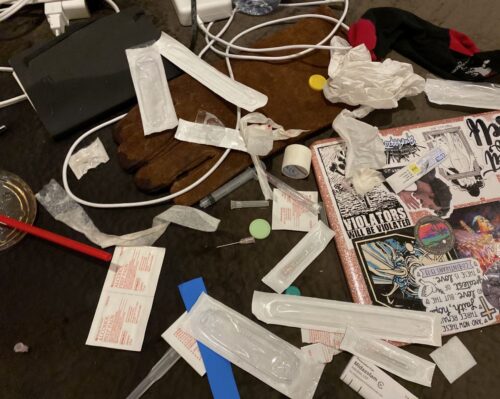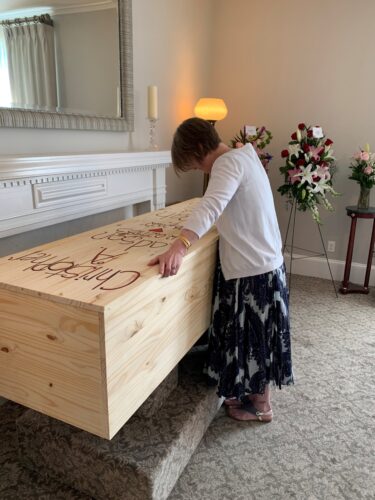By Joce Sterman and Daniela Molina
(InvestigateTV) — Dentists provide the critical cleanings, checkups and cavity fillings we need to stay healthy. However, there can be serious implications when they make a mistake or engage in misconduct.
A months-long InvestigateTV examination of dental board records from across the nation found that rather than facing serious consequences in egregious situations, some dentists are given a pass – allowed to hand in their licenses to avoid the harsh discipline some say is warranted. It’s a major shortcoming in accountability that one Maryland family learned about tragically.
When her phone rang with a Facetime call in the early morning hours of January 26, 2022, Rachel Harris said she immediately knew something was wrong. It was a familiar face on the other end of the line: the boyfriend of her younger sister, Sarah. But nothing could prepare her for what he would show her on screen.
“The morning my sister passed away, I was the first person he called, and I saw her dead body on the floor of his living room,” Harris said. “Something in my head switched, and I knew he was responsible for this.”
When emergency responders arrived at the Maryland home Sarah Harris was sharing with her boyfriend, Dr. James Ryan, they found an alarming site, court records show. Her body lay on a couch in a room littered with used syringes, alcohol wipes, tourniquets, and bottle after bottle of intravenous drugs rarely given outside the operating room.

Emergency responders found used needles, syringes and bottles of illicit drugs at the home of Sarah Harris following her death. (Credit: Montgomery County State’s Attorney’s Office)
Records show the bottles, some with needles still stuck inside, contained Propofol, Ketamine, Versed and other powerful medications used to soothe anxiety and put surgical patients to sleep. For Harris, 25, the combination meant she’d never wake up – the victim of a fatal overdose.
Just weeks later, an arrest warrant was issued for Ryan, charging him with second-degree murder. It was a fall from grace for the respected dentist and oral surgeon who appeared as the picture of professionalism in a YouTube video touting his now-shuttered practice.
It was in that office where Sarah Harris met Ryan. She started as a patient in 2020, then became an employee in Ryan’s practice several months later, eventually becoming his girlfriend the following year. The relationship turned the aspiring model into an addict and the prominent dentist into a prisoner, convicted for his role in Sarah’s death in August 2023.
“He’s a monster. Evil,” said Tina Harris, Sarah’s mother.
Prosecutors say Ryan’s sinister acts included continuously supplying Sarah with potent, injectable drugs diverted from his practice along with the medical equipment needed to use them including needles, fluids, IV bags and poles.
According to Sarah’s family, he began medicating her to help her cope with mental health issues she was struggling with. But it continued and intensified during their year-long relationship, with police saying she “developed an ever-worsening addiction that was continuously fed over months by Ryan.”
Following Ryan’s conviction on charges including second-degree murder, involuntary manslaughter and drug charges, Montgomery County State’s Attorney John McCarthy said, “He was the drug dealer. He was bringing drugs to her. He was bringing her drugs to the house that were being administered in a nonclinical setting with none of the safeguards you would expect to be taken.”

Sarah Harris is seen before taking the stage to compete in the Miss Maryland USA pageant in 2021. (Credit: Edwin Shaw Photography)
Although the Harrises had seen troubling signs of addiction and tried to intervene as they watched the former pageant queen waste away to just 83 pounds, the family says they were unaware of the full extent of the abuse until after Sarah’s death.
In the months leading up to her passing, the family had been distracted by several tragedies, including the unexpected death of their son and brother, Christopher. He died less than three weeks before Sarah, with their remains buried together in a Maryland cemetery.

Tina Harris stands over the casket that contains the remains of her son, Christopher, and daughter Sarah. The pair were buried together after passing away just weeks apart in 2022. (Credit: Harris Family)
Rachel Harris believed from the beginning that her sister’s death was more than just a tragic overdose. So, in the days following she began digging through her sister’s computer and social media accounts, uncovering text messages that would prove critical to the criminal case.
Police investigating the case said those texts showed a shared addiction, facilitated by Ryan, who routinely told Sarah to take the medication he left for her, stowing controlled substances in his trunk for her along with the needles needed to take them. The messages also detailed how he brought drugs and supplies home on multiple occasions, with charging documents indicating Sarah had even overdosed previously. One exchange between the couple shows Ryan had injected Sarah with Ketamine while she was sleeping just weeks before her death.
“Those text messages were heartbreaking. Horrifying and heartbreaking would be the best way to describe them, because my sister was this beautiful angel and she lit up a room and he took it, and he destroyed her. Every bit of light that she had in her, he destroyed it,” Rachel Harris said.
“My blood boiled”: Dental board allowed license surrender after murder charge
Just days after Dr. Ryan was criminally charged with murder, the dental board tasked with holding him accountable professionally made a surprising decision. Rather than revoke or suspend Ryan’s license, documents obtained by InvestigateTV show the Maryland State Board of Dental Examiners allowed him to voluntarily turn it in.
“They should have said, ‘We’re taking it. We are suspending it on our end. We’re not giving you the opportunity to voluntarily give it over to us like you’re being a good guy by giving it to us,’” Tina Harris said.
The surrender document shows Ryan even has the option to petition the dental board to re-apply for his license in two years. The agency told InvestigateTV it does not discuss deliberative decisions.
“On what planet is that not enough for them to say, you know, okay, we’re going to need to go ahead and revoke this because this is absolutely disgusting,” Rachel Harris said.
Dental license surrenders for egregious conduct are not uncommon, happen nationwide
InvestigateTV and the Arnolt Center for Investigative Journalism at Indiana University discovered that license surrenders following egregious cases of misconduct, although shocking, are not entirely uncommon. We spent months drilling down into records for hundreds of dentists disciplined by dental boards in 45 states and Washington, D.C. over the last three years. Our team looked specifically at a sample of more than 300 individuals hit with the most serious disciplinary actions in states where records are publicly available.
Our investigation found dentists across the nation are often allowed to surrender their licenses rather than face more serious discipline like revocations or suspensions. While we found at least 30 revocations and more than 100 suspensions among the group, we also discovered at least 50 of the 300 dentists whose records were examined by InvestigateTV were given the option to hand in their dental licenses. Experts told InvestigateTV that surrenders allow dentists to avoid further board investigation or charges. The move also prevents the publication of more information about their case and circumvents the revocation process, which is considered a more severe punishment on their public record.
InvestigateTV found license surrenders made to dental boards across the nation following accusations and findings against dentists for the following:
• Driving under the influence arrests
• Sexual misconduct in the office
• Practicing while intoxicated
• Gross negligence
• Infection control issues
• Drug diversion for personal use
• Oversedation
• Patient harm
“They don’t want to come down hard on someone by saying, ‘We’re taking it from you. We’re revoking it from you. You can voluntarily surrender it.’ I think that sends a very bad message. I think that gives liberty to dentists,” Tina Harris said.
Dentists who give up their licenses after misconduct can often reapply
In some cases, the freedom that comes with a license surrender allows dentists to try to get back into business after giving up their licenses. Disciplinary records InvestigateTV examined for Florida showed dentists who surrender there must agree never to reapply. But many states, including Iowa, Maryland, Missouri, Utah, and Virginia, give some dentists whose records we looked at the option to ask for their licenses back, sometimes in as little as a year.
“Just because someone has certifications, does not make them a good person,” Rachel Harris said. “And you need to be mindful of who you are seeing. You need to be mindful and protect yourself and your family because monsters exist and most of the time they’re hiding in plain sight.”
InvestigateTV spent weeks contacting industry experts, including attorneys who handle licensing and malpractice cases, expert witnesses, academics and groups focused on dental ethics and education to get any reaction to our findings. No one we contacted was willing to talk on camera or do an interview.
The American Dental Association, the powerful lobbying group that helps shape policies for dentists across the nation, refused our interview request. The organization pointed us to the American Association of Dental Boards, or AADB, an umbrella group representing disciplinary boards in every state.
We attempted to contact leadership at the AADB beginning in September. After numerous emails and phone calls to the AADB through its official channels, an attorney on the group’s board eventually responded. Susan Rogers, who also serves as executive director and general counsel for the Oklahoma Board of Dentistry, said she wasn’t authorized to speak for the group. Later, she stopped responding to repeated offers to talk about the story on background and interview requests.
For now, the Harris family is fine with doing all the talking, even though it dredges up regrets and pain about the sister and daughter they lost. Tina Harris struggles with believing she could have prevented her daughter’s death if she had intervened with more force or reported Dr. Ryan, whose attorneys did not respond to emails or phone calls seeking comment.
“She was perfection in my eyes. And I ache for her every day, every second of the day. And it doesn’t get easier as time goes on. It gets harder because I feel she’s getting further from me. She was my world,” Tina Harris said.

The family of Sarah Harris, an aspiring model murdered by her boyfriend, is now fighting to change laws related to dentist oversight. (Credit: Harris Family)
It’s a world they now want to change, in Sarah’s honor. The family is actively working on advocacy efforts and pushing state lawmakers on issues related to transparency and oversight for dental boards as well as efforts to focus more attention on dentists who divert drugs from their practices.
“In some people’s minds, it’s like you’re going up against this power that is incredibly difficult to go up against. But I am a fighter. I wasn’t going to be scared and I’m not,” said Rachel Harris. “My sister’s story will be told, and we’re going to fight for something to be put in place where these doctors are held accountable.”
Olivia Oliver, Ashton Hackman, Julia Pearl, Rebekah Schultz, Lily Marks, Mitch Lierman, and Emma Luce with the Arnolt Center for Investigative Journalism at Indiana University contributed to the research for this report.


